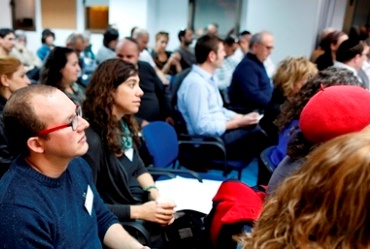What are the challenges facing Jewish education in Israel today? What are its main strengths and weaknesses, and are there also reasons for optimism? These were the questions posed by the Mandel Platform event, “Home, Community, State: Where Does Jewish Education Belong?” which was held at the Mandel Leadership Institute at the end of December.
“The term ‘Jewish education’ sounds alien, even jarring, to Israeli ears. Israelis find it even stranger and more annoying than terms such as ‘democratic education,’ ‘religious education’ and ‘Zionist education.’ Why does ‘Jewish education’ sound so uncontroversial, trivial even, to Jews outside of Israel, and yet cause Israelis such discomfort?” asked
Dr. Eli Gottlieb, director of the Mandel Leadership Institute, and vice president of the Mandel Foundation-Israel. “Our goal at MLI is for Jewish education to become commonplace, rather than an esoteric pursuit, and for it to have relevance wherever there are people whose Jewishness is important to them,” he said.
“The central challenge, for a member of the Jewish renewal movement, is to transition from a discourse concerned with renewing the link between the Jewish people and Jewish tradition, to a discourse about Jewish renewal within Israeli society,” said
Dr. Donniel Hartman, president of the Shalom Hartman Institute. “[Here in Israel,] the link has been renewed; but now the question is, what are we educating toward? What is the essence of this Jewish identity? Is Judaism to be a force for good in Israeli society, or a corrupting influence? Will it be an ally of nationalism, xenophobia and racism, or will it inspire a more uplifting discourse, offering an alternative vision for society?” According to Hartman, the strength of Jewish education in today’s Israel - the possibility for Jewish education to be provided as part of the public education system - is also its weakness, because this lays it open to political pressure: “Everyone wants Jewish education to further his or her own political goals.”

An entirely different view was taken by
Dr. Ram Fruman, chairman of the Secular Forum, an organization working toward the establishment of a secular state education stream. “The process of “religification” in Israel - the increasing dominance of religious attitudes and strictures - is up against a secular society that is in the midst of an extended crisis of values… and that refuses to recognize its own decline, from hegemonic majority to minority with no political power,” he said. “The education system is the central arena for this process of increasing religious dominance in Israeli society, and it’s entirely subject to the whims of any minister of education, most of whom have been - and will continue to be - religious, or nationalist, or both.” As to the place of Jewish education within the secular state education stream he’s seeking to establish, Fruman said: “Anyone involved in teaching Judaism to secular Israelis, in contributing to the rise of this discourse, is thereby involved in this “religification” process, no matter how worthy their values may be… What concerns me is not what the nature of Jewish education should be, but rather how to do away with it.”
An alternative secular approach to Jewish renewal was presented by
Dr. Ruth Calderon, former Yesh Atid MK and a scholar of Talmud and rabbinical literature. “The greatest challenge we face is how to create meaning for young people and offer them a clear sense of identity, without resorting to
halakha [Jewish religious law]… Jewish renewal invites Israel’s secular majority to take seriously the Jewish dimension of their identity, both as a culture and as a sense of national belonging… I wouldn’t want there to be fully separate streams of education with nothing in common. It’s better that we all learn in one state education system, and teach our children the importance of debate and of respecting others’ opinions.
Rabbi Bezalel Cohen, an Israeli Haredi (ultra-Orthodox) educator, spoke about the challenges of Jewish education in the Haredi community. “Some of the challenges we face relate to making relevant texts that are thousands of years old… Others relate to how we should educate in an era in which our children are exposed to other ways of life. The current Haredi education system is neither willing nor able to deal with the questions of those who don’t follow the straight and narrow.”
Following the panel discussion, a number of break-out sessions were held, led by MLI faculty members. The session titled
“And you shall teach it to your sons and your daughters,” led by
Yael Bar-Lev, explored questions relating to the transmission of values and knowledge from generation to generation within families.
Bambi Sheleg led a session titled
“What is the Jewish Content of the State of Israel?” examining the unique content of Israel as a Jewish state. The challenge and potential inherent in
“Encounters Between Traditions in Israel” were discussed in a session led by
Dr. Yehuda Ben-Dor, while
Rabbi Mishael Zion and
Naomi Perl led
“Inside Out,” looking at the internal discourse of communities in contemporary Israel.
The
Mandel Platform is a forum that seeks to enrich the dialogue within the Mandel community and among the public at large through encounters with leading researchers, thinkers, policy-makers and practitioners. The Platforms address fundamental subjects with great consequences for life in Israel and for Israeli society: education and community; economy and society; the army and the state; and the Haredi community.
